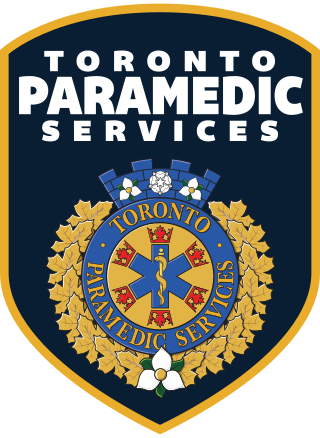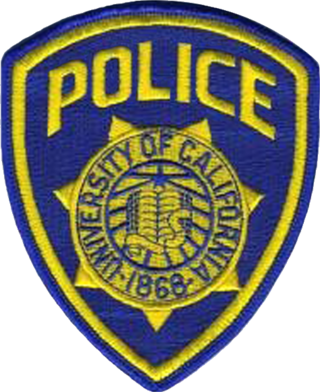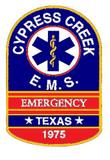
A paramedic is a healthcare professional trained in the medical model, whose main role has historically been to respond to emergency calls for medical help outside of a hospital. Paramedics work as part of the emergency medical services (EMS), most often in ambulances. They also have roles in emergency medicine, primary care, transfer medicine and remote/offshore medicine. The scope of practice of a paramedic varies between countries, but generally includes autonomous decision making around the emergency care of patients.
A medical director is a physician who provides guidance and leadership on the use of medicine in a healthcare organization. These include the emergency medical services, hospital departments, blood banks, clinical teaching services, and others. A medical director devises the protocols and guidelines for the clinical staff and evaluates them while they are in use.

A police academy, also known as a law enforcement training center, police college, or police university, is a training school for police cadets, designed to prepare them for the law enforcement agency they will be joining upon graduation, or to otherwise certify an individual as a law enforcement officer, typically a police officer.

The City of Toronto Paramedic Services, is the statutory emergency medical services provider in Toronto, Ontario, Canada. The service is operated as a division of the City of Toronto, under the Community & Social Services cluster. The service is funded by the municipal tax base, and operates similarly to other municipal divisions, such as the Toronto Parks, Forestry & Recreation division, or the Toronto Water division, but retains operational independence from other divisions. While under municipal government control, it is subject to provincial legislation and licensing. It is not the only service provider in its area; private-for-profit medical transport services also provide routine, non-emergency transports and coverage for special events, but the statutory emergency medical system is the only provider permitted to service emergency calls.

The Oklahoma City Police Department (OCPD), was established in 1889 following the Land Run. The OCPD is the largest law enforcement agency in the State of Oklahoma and has primary police jurisdiction within the corporate limits of the City of Oklahoma City. The OCPD is one of the oldest police departments in Oklahoma, tracing its roots back to Indian Territory.
A field training officer (FTO) is an experienced or senior member of an organization who is responsible for the training and evaluation of a junior or probationary level member. The role is used extensively in law enforcement, fire departments, and emergency medical services.
The Police Training Officer program (PTO) is a post-academy training program created from the educational approach known as problem-based learning. Program development was funded by the United States Department of Justice Office of Community Oriented Policing Services to train police recruits once they graduate from the police academy. It was initially developed to replace the 30-year-old Field Training Officer (FTO) program, which research surveys indicated had become incompatible with community based policing and problem solving.

Louisville Metro Emergency Medical Services is the primary provider of pre-hospital life support and emergency care within Louisville-Jefferson County, Kentucky. LMEMS is a governmental department that averages 90,000 calls for service, both emergency and non-emergency, each year.
An incident response team (IRT) or emergency response team (ERT) is a group of people who prepare for and respond to an emergency, such as a natural disaster or an interruption of business operations. Incident response teams are common in public service organizations as well as in other organizations, either military or specialty. This team is generally composed of specific members designated before an incident occurs, although under certain circumstances the team may be an ad hoc group of willing volunteers.

Police departments in the University of California system are charged with providing law enforcement to each of the system's campuses.

Cypress Creek Emergency Medical ServicesAssociation, also known as Cypress Creek EMS (CCEMS) was a private, non-profit emergency medical service provider for Harris County ESD 11 in North Harris County, within greater Houston, Texas. In 2021, CCEMS declared bankruptcy and operations ceased in mid 2022. In late 2022, the remaining assets, branding, and trademarks were bought by Viking Enterprises, DBA City Ambulance Service. All ambulances in use by CCEMS are Mobile Intensive Care Units (MICU), with at least one Paramedic, making all ambulances ALS units. Cypress Creek EMS provided 911 service in North Harris County, provided bicycle medic teams for special events, provided tactical EMS support for federal, state, and local law enforcement, and operated an accredited educational institution.

UCLA Emergency Medical Services (UCLA EMS) is a student-run Emergency Medical Services organization at the University of California, Los Angeles. Part of the University of California Police Department (UCPD), UCLA EMS provides 9-1-1 emergency medical response to the UCLA campus and surrounding areas 24 hours a day, 365 days a year. Each year, UCLA EMS responds to over 1,700 calls for medical aid, making it one of the busiest collegiate EMS agencies in the nation.

The West Virginia State Police Academy is a law enforcement training institution, operated by the West Virginia State Police, located in Institute, West Virginia. The academy trains West Virginia troopers for the State Police force and newly hired municipal, university police officers, sheriff deputies, motor carrier enforcement and conservation officers from across the state. It and the Fairmont State University Police Academy in Fairmont, West Virginia are the only law enforcement training schools in West Virginia.

The San Jose Police Department (SJPD) is the police agency for San Jose, California. The San Jose Police Department is led by Chief of Police Anthony Mata.

The San Juan Police Department is the primary law enforcement agency for the city of San Juan, PR, with jurisdiction only in the city limits of San Juan. It is also the largest municipal police force in the commonwealth, and the second largest of any police force in the commonwealth, after the Puerto Rico Police Department. It was created in 1977 under law #19 of May 12, 1977, known as the Municipal Police Law creating local police forces in each city of Puerto Rico.

Tactical Emergency medical services (TEMS) is out-of-hospital care given in hostile situations by specially trained practitioners. Tactical support provided through TEMS can be applied in either the civilian world, generally with special law enforcement teams such as SWAT and SERT, as well as with military special operations teams. Tactical EMS providers are paramedics, nurses, and physicians who are trained to provide life-saving care and, sometimes, transport in situations such as tactical police operations, active shooters, bombings, and natural disasters. Tactical medical providers (TMPs) provide care in high risk situations where there is an increased likelihood for law enforcement, civilian, or suspect casualties. TEMS units are also deployed in situations where traditional EMS or firefighters cannot respond. TMPs are specially trained and authorized to perform live-saving medical procedures in austere and often times unconventional environments. TMPs are also expected to be competent in weapons safety and marksmanship, small unit tactics, waterborne operations, urban search and rescue, and HAZMAT. TMPs also serve to train their respective teams in complex medical procedures that may be performed in their absence. TEMS providers are sometimes sworn police officers cross trained as paramedics, paramedics that are operators trained and integrated into the SWAT Team, or medical providers trained in tactical EMS who are then integrated into law enforcement or military units.

The Comal County Sheriff's Office is a law enforcement agency headquartered in New Braunfels Texas, with county wide jurisdiction.
The Virginia Beach Department of Emergency Medical Services is the 911 EMS provider for Virginia Beach, Virginia. Virginia Beach is the largest city in the United States with a volunteer based EMS system. Since the 1940s Virginia Beach has offered free pre-hospital emergency services through 10 volunteer rescue squads supported by 1,100+ volunteers throughout the city. Virginia beach EMS has also been a leader in a variety of pre-hospital technologies including 12-lead transmission,EZ-IO technology and therapeutic hypothermia,rapid sequence induction and intubation (RSII),video laryngoscope,end tidal CO2 monitoring,S T Elevation Myocardial Infarction (STEMI) and Stroke programs and community CardioPulmonary Resuscitation (CPR),among others. These programs and more have contributed to the 36% cardiac arrest survival rate (2012).
William H. Adcox is the Chief Security Officer for the University of Texas MD Anderson Cancer Center and a pioneer of Threat Safety Science in healthcare. He is also the Chief of Police and Chief Security Officer at the University of Texas at Houston Police Department, which is a component of the University of Texas System. He has had a longstanding career as a police officer and Deputy Chief of Police in El Paso, Texas.

On May 25, 2020, George Floyd, a 46-year-old black American man, was murdered in Minneapolis by Derek Chauvin, a 44-year-old white police officer. Floyd had been arrested after a store clerk alleged that he made a purchase using a counterfeit $20 bill. Chauvin knelt on Floyd's neck for over nine minutes while Floyd was handcuffed and lying face-down in a street. Two other police officers, J. Alexander Kueng and Thomas Lane, assisted Chauvin in restraining Floyd. Lane had also pointed a gun at Floyd's head before Floyd was handcuffed. A fourth police officer, Tou Thao, prevented bystanders from intervening.













